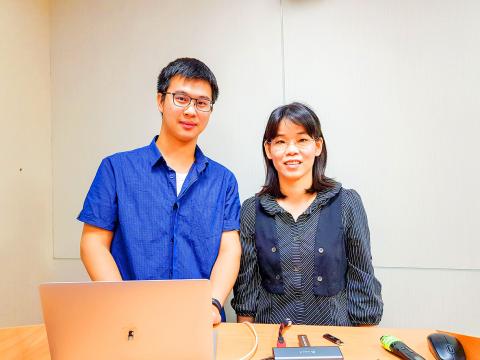Academia Sinica geoscience researchers yesterday unveiled a study that used GPS data to track the nation’s crustal changes following the 921 Earthquake in 1999, to shed more light on the creation of mountains and seismic cycles.
The magnitude 7.3 earthquake occurred on Sept. 21, 1999, in Nantou County’s Jiji Township (集集), leaving 2,456 people dead and destroying thousands of buildings.
Subterranean rocks at a depth of 20km had stabilized one year after the quake, but deeper layers might be still changing very slowly today, Academia Sinica Institute of Earth Sciences researcher Hsu Ya-ju (許雅儒) said.

Photo: Chien Hui-ju, Taipei Times
While GPS data has been used to study fault lines in previous studies, the team developed a new method of using such data to model geographical changes from the Earth’s surface to subterranean layers 50km in depth without having to make a lot of hypotheses, she said.
The study extends from a master’s thesis written by Tang Chi-hsien (唐啟賢) in 2016, when he was studying at National Central University, Hsu said.
Tang, 27, is serving alternative military service by doing research at the institute and plans to return to National Taiwan University to complete his doctoral degree.
Hsu and Tang worked with University of Southern California professor Sylvain Barbot and Nanyang Technological University professor James Moore to study GPS data about crustal changes collected over 14 years following the quake.
Taiwan has many mountains higher than 3,000m, but it is not yet clear how they arose from the Earth’s crust and the team’s study could offer some clues, Tang said.
Tang grew up in Hualien, where earthquakes are frequent, and that motivated him to research seismic activity, he said.
The team detailed their findings in a paper titled “Lower-crustal rheology and thermal gradient in the Taiwan orogenic belt illuminated by the 1999 Chi-Chi earthquake” which was published in the journal Science Advances.
The team’s findings are also useful for other nations, as rock strata in different nations share common features, institute director Chung Sun-lin (鍾孫霖) said.
To commemorate the 20th anniversary of the 921 Earthquake, the Taiwan Earthquake Research Center is to hold an international conference in September, Chung added.

Alain Robert, known as the "French Spider-Man," praised Alex Honnold as exceptionally well-prepared after the US climber completed a free solo ascent of Taipei 101 yesterday. Robert said Honnold's ascent of the 508m-tall skyscraper in just more than one-and-a-half hours without using safety ropes or equipment was a remarkable achievement. "This is my life," he said in an interview conducted in French, adding that he liked the feeling of being "on the edge of danger." The 63-year-old Frenchman climbed Taipei 101 using ropes in December 2004, taking about four hours to reach the top. On a one-to-10 scale of difficulty, Robert said Taipei 101

Taiwanese and US defense groups are collaborating to introduce deployable, semi-autonomous manufacturing systems for drones and components in a boost to the nation’s supply chain resilience. Taiwan’s G-Tech Optroelectronics Corp subsidiary GTOC and the US’ Aerkomm Inc on Friday announced an agreement with fellow US-based Firestorm Lab to adopt the latter’s xCell, a technology featuring 3D printers fitted in 6.1m container units. The systems enable aerial platforms and parts to be produced in high volumes from dispersed nodes capable of rapid redeployment, to minimize the risk of enemy strikes and to meet field requirements, they said. Firestorm chief technology officer Ian Muceus said

MORE FALL: An investigation into one of Xi’s key cronies, part of a broader ‘anti-corruption’ drive, indicates that he might have a deep distrust in the military, an expert said China’s latest military purge underscores systemic risks in its shift from collective leadership to sole rule under Chinese President Xi Jinping (習近平), and could disrupt its chain of command and military capabilities, a national security official said yesterday. If decisionmaking within the Chinese Communist Party has become “irrational” under one-man rule, the Taiwan Strait and the regional situation must be approached with extreme caution, given unforeseen risks, they added. The anonymous official made the remarks as China’s Central Military Commission Vice Chairman Zhang Youxia (張又俠) and Joint Staff Department Chief of Staff Liu Zhenli (劉振立) were reportedly being investigated for suspected “serious

American climber Alex Honnold is to attempt a free climb of Taipei 101 today at 9am, with traffic closures around the skyscraper. To accommodate the climb attempt and filming, the Taipei Department of Transportation said traffic controls would be enforced around the Taipei 101 area. If weather conditions delay the climb, the restrictions would be pushed back to tomorrow. Traffic controls would be in place today from 7am to 11am around the Taipei 101 area, the department said. Songzhi Road would be fully closed in both directions between Songlian Road and Xinyi Road Sec 5, it said, adding that bidirectional traffic controls would